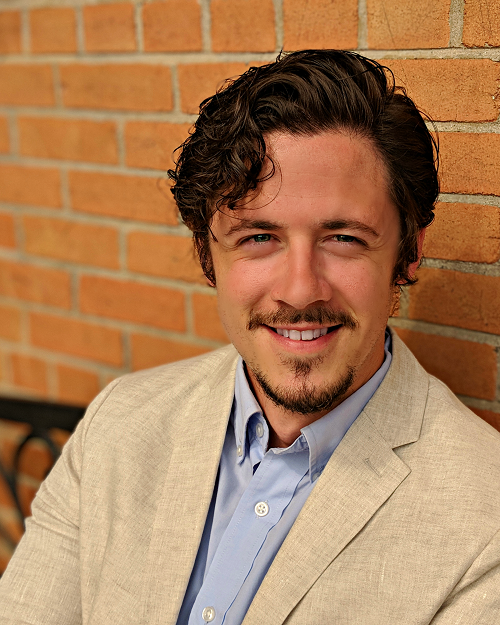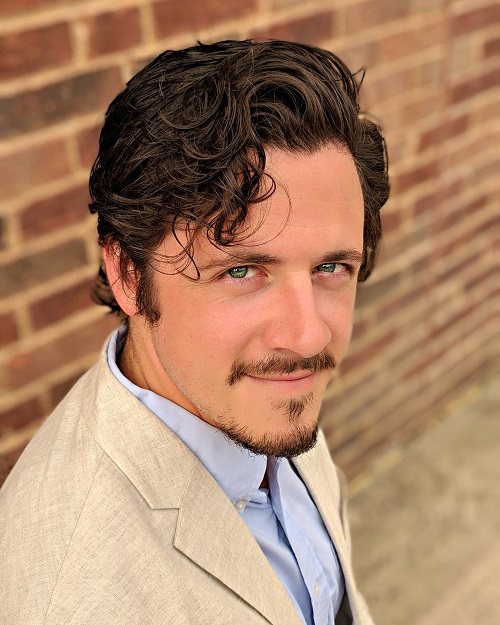
An ex performer in the Dallas Opera, Hastings Reeves performed in over 30 operatic roles in more than seven languages. While he loved performing, he began to crave a more stable career as the years went by. His brother, a former music educator, had recently switched careers to become a software engineer, which inspired Hastings to consider a career change of his own. He says data science is not all that different from opera singing–at least in terms of multitasking and working with different inputs.
“There’s a lot of multitasking when you’re singing in an opera,” he said. “You have your own role, but then there are five other lead roles, the chorus, an orchestra, and a conductor yelling at you. You have to take a lot of things in and still do your part.” Hastings said he chose Springboard because he was looking for a flexible program that he could complete on his own time while being a stay-at-home dad for his young daughter during the pandemic.
I completed a doctoral degree in vocal pedagogy at the University of North Texas. In the meantime, I performed with a lot of different companies on opera, choral work, and oratoria around the United States and in Europe. It was really fun. The pandemic changed my outlook career-wise. It changed a lot of job opportunities within the university setting, which is what I was gearing up for, so I took the opportunity to learn something new.
I was an opera singer. I loved it. It was fun. I’ve been performing since I was 25. I’ve performed in 30 roles or so in seven or eight different languages. It was incredible. Music is still a huge passion of mine and I do gigs as they come up. But I wanted to focus on other things and get a more stable, dependable job. I decided to pursue data science and here I am.
That’s a convoluted question. When COVID hit, my younger brother made a similar transition from music education to software engineering. He said, "You should try to code in Python. Just teach yourself, see if you like it. If you do, there are some great career paths out there.”
I owe it to my brother for giving me that push and alerting me to the fact that this was even a possibility. I started reading about machine learning, scratched that itch for data science and machine learning algorithms, and just fell headfirst into it. A few months later I found Springboard.

Having a unique background shows you have self motivation and that you've done a lot of things. Performing as an opera singer is a pretty difficult task. I've also built custom homes. I've done a lot of different things that show I have valuable skill sets.
It would have been easy to get down on myself for not having a bachelor's degree in computer science, but the education I had was valid and beneficial. It just comes down to having the resources at your disposal to teach yourself something new and having the tenacity to keep going even when you are drowning in the deep end.
There was a greater learning curve. I had a lot of confusion and fear during my first capstone project. I thought, "Oh, my gosh. I can't do this. What's going on?" But if you're feeling that way then you're probably doing something right because you're learning something new, and that's fantastic. That's something to strive for your entire life—finding those things that make you uncomfortable.
The first performance I ever did was a music theater show, Les Miserables, in high school. I loved it. I had never been able to express myself like that before. I think theater has a strong correlation to learning a new coding language or a data visualization tool: I loved to see how all of the instrumental and vocal parts worked in combination to create this massive, incredible production.
After that I pursued an undergraduate degree in music performance—I sang in a lot of choirs. I performed in an opera by Mozart called La finta semplice. That was it. Over the next decade, I fell down that rabbit hole and I absolutely loved everything I did.
It works similar parts of the brain, so in that way, it's not a huge stretch mentally to focus on all these things like multitasking, trying to see the bigger picture and how all the different pieces fit.
Data science is about having a yearning to solve problems, when it comes down to it. Are you curious? Do you have to know things? If you see something and you don't understand what's going on, do you say " I don't get that," and move on? Bear in mind, that’s a perfectly valid response. Or do you say, "I cannot move on until I understand exactly how that works”? That's how I think about thing

I chose Springboard because it was self-paced and while there are other self-paced programs, this one includes weekly one-on-one calls with a mentor. Since I was jumping into something very new, that was big for me. I chose Springboard because of the flexibility. Since the beginning of the pandemic, I've been watching my daughter full-time. She was in preschool, but then it closed down until the end of last summer. Also, the Springboard curriculum looked great and it checked off all the boxes in terms of what I was looking for.
My mentor was AJ Sanchez [chief data scientist and principal software engineer at Exodus Software Services]. Bless this man's soul. We’d be discussing how a particular algorithm works and my four-year-old would come in and go, "Hi. How are you?" He just rolled with it. He was so kind.
I remember halfway through my first project I freaked out and I was like, "I don't even know what any of this code means. I have no idea." He said, "That's okay. We'll learn. I'll teach you. That's the point of this. Don't worry." He taught me that failure is good because it means you’re learning something new. The rest was history. We just walked through the program step by step. I would not have learned half of what I did without AJ.
It depends on the business you're in. Failure is more palatable for certain businesses. During one of my first meetings with my team lead last week, she said, "Be brave enough to fail,for these first couple of months. Our expectations are not that you come in and you can do everything on your own. It's that you are willing to fail and willing to learn. You should be curious and able to pick things up as you go." I think that's a good place to start.
I knew with my background that I was not going to land a data science role immediately, so I focused on what I did best at Springboard: storytelling, data visualization, and data analysis. In terms of coding languages, I understood SQL a lot better than I did Python. That led me to data analyst roles.
If you've done some coding, are familiar with different programming languages, and have a master’s degree or Ph.D., you can probably land a junior data scientist role.
Having weekly one-on-one mentorship and talking to a career coach once every two weeks. The job search is daunting and it’s easy to give up. But I learned very quickly that it’s a numbers game. I sent over 700 applications in four months, did 43 interviews and landed three offers.The last offer was the one I chose. It takes time.
Set a clear goal and then go for it. I knew I wanted to be in this field. I wanted to be able to work remotely and have a certain salary. It's a very exciting market right now, and it's not going to slow down for a while. Getting in now is a great opportunity. Be curious, be okay with failing, and learn a little more everyday.





